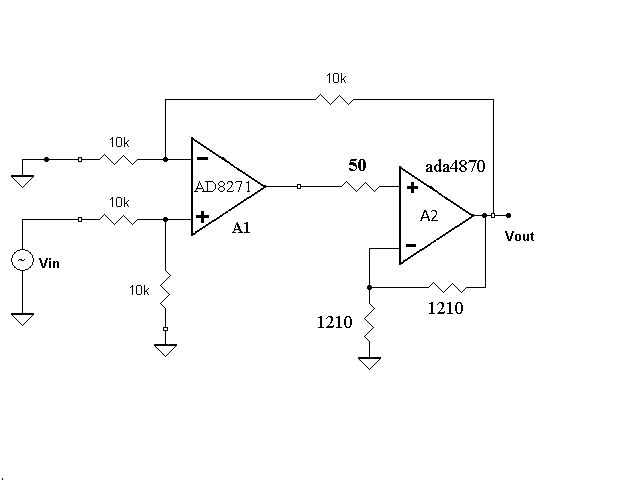A 15W precision difference amplifier with thermal shutdown
This precision amplifier can source or sink 1A, making it ideal for high-power applications such as component stereos, self-powered speakers and home theatres. Many applications require both high precision and high output current. A simple way to provide both is to combine a precision amplifier with a power amplifier.
By Chau Tran, Analog Devices.
Placing an ADA4870 high-power amplifier inside the feedback loop of an AD8271 precision difference amplifier allows the circuit to provide the high output current of the ADA4870 while maintaining the DC precision of the AD8271. The output buffer can easily source or 1A; the high-precision, low-distortion preamp with trimmed on-chip resistors provides lower gain drift and gain error, and higher common-mode rejection, than discrete designs.

The ADA4870 draws about 30mA, but a power saving shutdown feature reduces the quiescent current to approximately 750µA. Simply pull the shutdown pin low and the circuit turns off.
High output current amplifiers generate heat, causing the die temperature to increase, so a heat sink will be typically be required to improve the long-term reliability and keep the die temperature at a level such that the thermal protection circuitry is not activated under normal circumstances.
In addition to short-circuit protection, the ADA4870 is protected against excessive die temperatures. When detected, the amplifier switches to an off state, dropping the supply current to approximately 5mA. When the die temperature returns to an acceptable level, the amplifier automatically resumes normal operation. This thermal protection mode is very useful to prevent long-term thermal stress of the circuit. A device can heat up to a relatively high temperature if the fault condition is temporary. This greatly reduces the stress imposed by thermal cycling, which in turn improves its reliability under sustained fault conditions.
 |
Author Profile: Chau Tran joined Analog Devices in 1984 and works in the Integrated Amplifier Products (IAP) Group in Wilmington, MA. In 1990, he graduated with an MSEE degree from Tufts University. Chau holds more than 10 patents and has authored more than 10 technical articles. |








